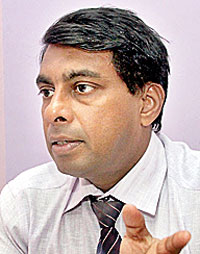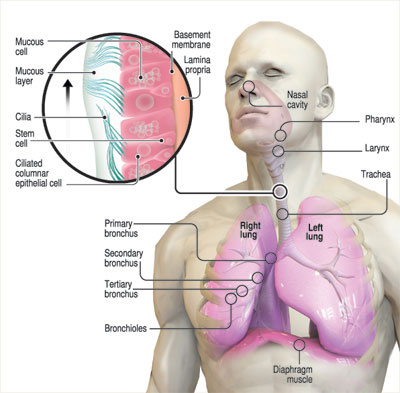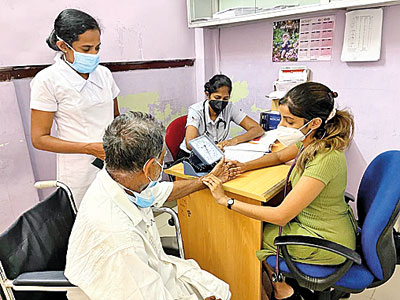News
Hypothesis on cold-water showers after a COVID-19 attack

Dr. Waruna Gunathilake
Nandada,epada (Should I bathe or not?) or Kawadada naanna puluwan (When can I bathe?), are some of the questions that keep cropping up from patients, says Consultant Physician Dr. Waruna Gunathilake, who with his team is running a Post-COVID Clinic at the National Eye Hospital, Colombo, since last year.
This innovative Physician focuses on what most of us scoff at as old wives’ tales.
These questions and concerns are relevant to our culture and social setting, he says, citing an observational study he has done with Dr. Rangana Karunarathna (Post-graduate trainee in Pathology) and Dr. Himansa Ranawaka (Registrar in Medicine).
He is a strong believer that when people are facing critical illness, it may be good to take the “middle path”, navigating tactfully with the bottom line being allopathic medicine but taking into consideration cultural and traditional beliefs.
Before he gets into the discussion, Dr. Gunathilake says that almost-all viral diseases such as chickenpox are considered Deiyange Leda (illness sent by divinity).
“Many of us western doctors give scant regard to the precautions taken with regard to these viral illnesses by our ancestors. However, it may be good to take people’s beliefs into consideration,” he urges.
Some of these beliefs are:
Don’t bathe in the evening, especially with cold water.
Don’t go out when there is dew. If you need to go out, then wrapup your head.
The condition of anyone who has phlegm, will get worsened due to the cold.
The cold will also trigger attacks caused by phlegm.
Women are advised not to bathe in the late evening.
When children are recovering from a viral illness like chickenpox, their grandmothers took extra precautions to bathe them in lukewarm water or warm water.
Then Dr. Gunathilake looks at the present and his team’s experiences where many COVID-19 patients who have recovered have said that after they got over the illness but had cold-water showers, hathiya wediwuna (wheezing increased). It was then that he and his team decided to conduct an observational study.
 The study finding:
The study finding:
The condition of patients who had recovered from COVID-19, but were exposed to cold-water showers, got worse.
Dr. Gunathilake says that worldwide scientific studies on the tracheo-bronchial tree have proven that cold temperatures including the cooling of a person’s body affect the efficient working of the ciliated epithelial cells. There is also evidence that cold temperatures impact the sinuses.
The bristle-like structures of the ciliated epithelial cells on the inner lining of the tracheo-bronchial tree, have an upward paddling effect to expel or get rid of (expectorate) phlegm, when it collects in the lungs due to any chesty condition. If the cell movement is inhibited, the phlegm will accumulate in the lungs.
“With such excessive secretion of phlegm and the non-optimal functioning of the ciliated epithelial cells, people complain that papuwata sema behala,” he says.
Next Dr. Gunathilake moves to COVID-19 and says that worldwide research indicates that this coronavirus causes an auto-immune response or hyper-immune response in an infected person’s body. This is while cold-water showers are also known to enhance the immune response, according to previous global scientific literature.
He then puts two and two together and comes up with a logical hypothesis but stresses that it is a hypothesis until further studies bring about conclusive evidence:

The post-COVID clinic at the National Eye Hospital
COVID-19 infection causes an aberrant enhancement of the immune response with a lot of cytokine and chemical mediator releases.
The same thing happens with exposure to coldwater– a person’s immune response gets more activated with cold water.
Therefore, there could be a possibility of the continuation of COVID-19 related symptoms for a longer period of time.
He urges his colleagues that it may be good to have a holistic approach without rejecting outright as old wives’ tales some of the beliefs of the people.
There is also a need to conduct immunological and pathophysiological studies to test out his hypothesis, he adds.
| Details of the observational study Here are the observational study details of Dr. Waruna Gunathilake and his team: The study was over a six-month period and covered nearly 80 participants 70% of the participants were women The study covered two age-peaks – 40 years and 50 years All participants were suffering from Post-COVID Syndrome – 98% had symptoms after 4 weeks of recovering from the infection, while 2% had a persistence of symptoms The first infection had been detected in 80% of the study participants through Rapid Antigen Testing (RAT) and 20% through RT-PCRs The participants had taken one or more vaccines – 66% AstraZeneca and 34% Sinopharm Many also complained of fatigue, shortness of breath, muscle pain Many of the women participants complained of mood changes and menstrual irregularities due to excessive clot-formation
| |
The best way to say that you found the home of your dreams is by finding it on Hitad.lk. We have listings for apartments for sale or rent in Sri Lanka, no matter what locale you're looking for! Whether you live in Colombo, Galle, Kandy, Matara, Jaffna and more - we've got them all!

